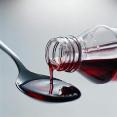
FDA Supports Voluntary OTC Cough, Cold Medicine Label Changes
The U.S. Food and Drug Administration has come out in support of the voluntary actions by the Consumer Healthcare Products Association (CHPA)--an association that represents most of the makers of nonprescription over-the-counter (OTC) cough and cold medicines in children--to modify product labels to state "do not use in children under 4." Additionally, manufacturers are introducing new child-resistant packaging and new measuring devices for use with the products.
FDA said it will continue to assess the safety and efficacy of these products and to revise its OTC monograph (list of approved ingredients and amounts) for these medicines. Although this new labeling is inconsistent with the current monograph, FDA will not object, under the circumstances presented here, to the new label modification, which reflects a more restrictive use of the drugs in children.
The steps that are being taken by CHPA will not affect the availability of the medicines, but this voluntary action will result in a transition period where the instructions for use of some OTC cough and cold medicines in children will be different from others.
FDA said it does not typically request removal of OTC products with previous labeling from the shelves during a voluntary label change such as this one; therefore, some medicines will have the new recommendation while others will instruct that they not be used for children under 2 years of age.
If parents or caregivers have or purchase a product that does not have the voluntarily-modified labeling, FDA recommends that they should adhere to the dosage instructions and warnings on the label that accompanies the medication and should not, under any circumstances, give adult medications to children. Parents or caregivers that have questions or are just not sure about how to use a product should consult with their doctor or pharmacist.
Until the safety and efficacy issues of OTC cough and cold medicines in children are resolved, FDA continues to recommend to parents and caregivers the following:
- Do not give children medications labeled only for adults.
- Talk to your healthcare professional if you have any questions about using cough or cold medicines in children.
- Choose OTC cough and cold medicines with child-resistant safety caps, when available. After each use, make sure to close the cap tightly and store the medicines out of the sight and reach of children.
- Check the "active ingredients" section of the DRUG FACTS label of the medicines that you choose. This will help you understand what symptoms the "active ingredients" in the medicine are intended to treat. Cough and cold medicines often have more than one active ingredient (such as an antihistamine, a decongestant, a cough suppressant, an expectorant, or a pain reliever/fever reducer).
- Be very careful if you are giving more than one medicine to a child. If you are giving more than one medicine to a child make sure that they do not have the same type of "active ingredients." If you use two medicines that have the same or similar active ingredients, a child could get too much of an ingredient and that may hurt your child. For example, do not give a child more than one medicine that has a decongestant.
- Carefully follow the directions for how to use the medicine in the DRUG FACTS part of the label. These directions tell you how much medicine to give and how often you can give it. If you have a question about how to use the medicine, ask your pharmacist or your doctor. Overuse or misuse of these products can lead to serious and potentially life threatening side effects such as rapid heartbeat, drowsiness, suppression of the respiratory system, seizures, and other adverse events.
- Only use measuring devices that come with the medicine or those specially made for measuring drugs. Do not use common household spoons to measure medicines for children because household spoons come in different sizes and are not meant for measuring medicines.
- Understand that using OTC cough and cold medicines does not cure the cold or cough. These medicines only treat your child's symptom(s), such as runny nose, congestion, fever, and aches, and do not shorten the length of time your child is sick.